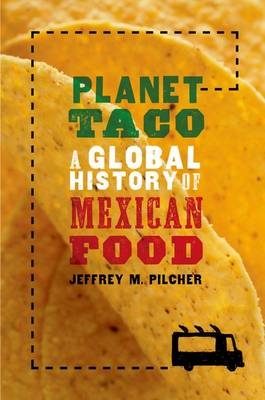
Planet Taco
Oxford University Press Inc (Verlag)
978-0-19-974006-2 (ISBN)
- Titel ist leider vergriffen;
keine Neuauflage - Artikel merken
Planet Taco asks the question, "what is authentic Mexican food?" The burritos and taco shells that many people think of as Mexican were actually created in the United States, and Americanized foods have recently been carried around the world in tin cans and tourist restaurants. But the contemporary struggle between globalization and national sovereignty to determine the meaning of Mexican food is far from new. In fact, Mexican food was the product of globalization from the very beginning - the Spanish conquest - when European and Native American influences blended to forge the mestizo or mixed culture of Mexico. The historic struggle between globalization and the nation continued in the nineteenth century, as Mexicans searching for a national cuisine were torn between nostalgic "Creole" Hispanic dishes of the past and French haute cuisine, the global food of the day. Indigenous foods, by contrast, were considered strictly declasse. Yet another version of Mexican food was created in the U.S. Southwest by Mexican American cooks, including the "Chili Queens" of San Antonio and tamale vendors of Los Angeles.
When Mexican American dishes were appropriated by the fast food industry and carried around the world, Mexican elites rediscovered the indigenous roots of their national cuisine among the ancient Aztecs and the Maya. Even this Nueva Cocina Mexicana was a transnational phenomenon, called "New Southwestern" by chefs in the United States. Rivalries within this present-day gourmet movement recalled the nineteenth-century struggles between Creole, Native, and French foods. Planet Taco also seeks to recover the history of people who have been ignored in the struggles to define authentic Mexican, especially those who are marginal to both nations: Indians and Mexican Americans.
Jeffrey M. Pilcher first tasted Mexican food at the age of eighteen in Las Cruces, New Mexico. After recovering from the initial blast of salsa, he dedicated himself to studying the history and cuisine of Mexico. A professor of history at the University of Minnesota, he is the author of Que vivan los tamales! Food and the Making of Mexican Identity, The Sausage Rebellion: Public Health, Private Enterprise and Meat in Mexico City, and Food in World History, and the editor of the Oxford Handbook of Food History.
Preface ; Introduction A Tale of Two Tacos ; Part I Proto-Tacos ; Chapter 1. Maize and the Making of Mexico ; Chapter 2. Burritos in the Borderlands ; Part II National Tacos ; Chapter 3. From the Pastry War to Parisian Mole ; Chapter 4. The Rise and Fall of the Chili Queens ; Chapter 5. Inventing the Mexican American Taco ; Part III Global Tacos ; Chapter 6. The First Wave of Global Mexican ; Chapter 7. The Blue Corn Bonanza ; Conclusion The Battle of the Taco Trucks ; Notes ; Select Bibliography ; Index
| Erscheint lt. Verlag | 25.10.2012 |
|---|---|
| Verlagsort | New York |
| Sprache | englisch |
| Gewicht | 556 g |
| Themenwelt | Sachbuch/Ratgeber ► Essen / Trinken |
| Geisteswissenschaften ► Geschichte ► Regional- / Ländergeschichte | |
| Geschichte ► Teilgebiete der Geschichte ► Kulturgeschichte | |
| Sozialwissenschaften | |
| ISBN-10 | 0-19-974006-2 / 0199740062 |
| ISBN-13 | 978-0-19-974006-2 / 9780199740062 |
| Zustand | Neuware |
| Haben Sie eine Frage zum Produkt? |
aus dem Bereich


